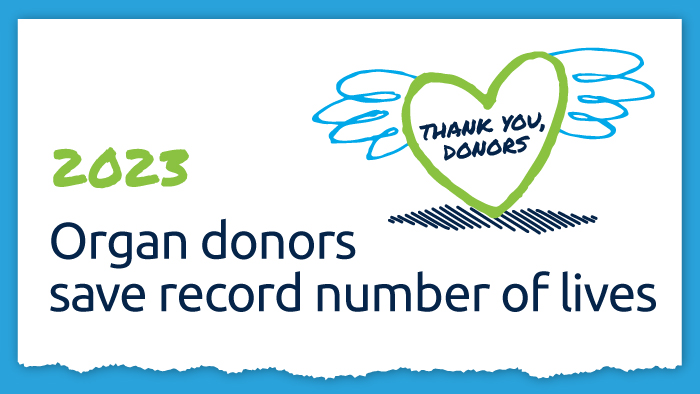More Black, non-Hispanic patients received organ transplants than ever before
Today, the United Network for Organ Sharing (UNOS) announced another record year for organ transplants, with 46,632 transplants performed in 2023 thanks to the selfless and generous gifts from donors. In addition, 10,824 Black patients received transplants last year, more than any year prior.
Under contract with the federal government, UNOS manages the national transplant waitlist that matches patients with lifesaving organs. UNOS tracks the number of transplants performed for each organ and identifies trends in organ donation and transplantation.
Last year marked the 13th consecutive year of record deceased donors. Additional milestones reached include:
- More than 16,000 individuals became deceased donors, making 39,679 deceased donor transplants possible. That’s nearly a 9% increase from 2022.
- There were 10,660 liver transplants performed in 2023 – the most ever performed in a single year.
- A 30% increase from 2022 in donors aged 65 years and older, representing a greater acceptance by the transplant community and candidates to receive organs from medically more complex donors.
“It is important to remember that these milestones are more than just numbers – they reflect real people who can go on hikes with their spouse again and got to spend the holidays with their loved ones,” said Maureen McBride, Ph.D., CEO of UNOS. “I also want to recognize the selfless donors whose generosity made these life-changing transplants possible. I am grateful and thankful for each donor and know that as long as we remember the profound ripple effect of their decision, we will never lose sight of our mission.”
The increase in transplants in 2023 is the result of several initiatives that have helped increase equity and enhance patient access to transplants, which were driven by the organ donation and transplant community and the Health Resources and Services Administration, the federal government agency overseeing the Organ Procurement and Transplantation Network (OPTN). Some of these policy updates and technological advancements include removing race from kidney function measurements, increasing equity in lung transplants through continuous distribution, and making it easier for transplant programs to filter organ offers so an available organ is transplanted more quickly.
The transplant community’s commitment to continuous system improvements drives the year-over-year increases in the number of lifesaving and lifechanging transplants performed. These improvements are necessary to ensure that each of the more than 103,000 patients on the national waitlist has an opportunity to receive a transplant.
UNOS continues to work with the organ donation and transplant community and the federal government to advance its Action Agenda, a series of reforms to improve the organ donation and transplant system. This includes advocating for access to pre-waitlist data to enhance equity and to make it easier for organs to be transported in the cabin of commercial airplanes to help reduce the time it takes for an organ to get to a patient. Additionally, the OPTN is spearheading the Expeditious Task Force that is taking massive steps forward to reduce organ non-use.
“Patients and donors motivate us to work collaboratively with the organ donation and transplant community and the government to strengthen the system,” continued McBride. “That way even more patients can access and receive high-quality and equitable transplant care.”
For more information on 2023’s organ donation and transplant numbers and to learn more about the patients and donors, please visit: unos.org.
About United Network for Organ Sharing
United Network for Organ Sharing (UNOS) is a nonprofit, charitable organization that manages the Organ Procurement and Transplantation Network (OPTN) under contract with the federal government. The OPTN helps create and define organ allocation and distribution policies that make the best use of donated organs. This process involves continuously evaluating new advances and discoveries so policies can be adapted to best serve patients waiting for transplants. All transplant programs and organ procurement organizations throughout the country are OPTN members and are obligated to follow the policies the OPTN creates for allocating organs.

